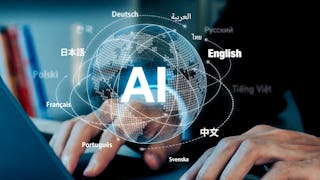Ce cours IBM vous permettra d'acquérir les compétences nécessaires pour mettre en œuvre, former et évaluer des modèles IA génératifs pour le traitement du langage naturel (NLP) à l'aide de PyTorch. Vous explorerez les tâches NLP de base, telles que la classification de documents, la modélisation du langage et la traduction, et obtiendrez une base dans la construction de petits et grands modèles de langage.

Profitez d'une croissance illimitée avec un an de Coursera Plus pour 199 $ (régulièrement 399 $). Économisez maintenant.

Modèles fondamentaux de l'IA pour le NLP et la compréhension du langage
Ce cours fait partie de plusieurs programmes.


Instructeurs : Joseph Santarcangelo
24 358 déjà inscrits
Inclus avec
(170 avis)
Expérience recommandée
Ce que vous apprendrez
Expliquer comment l'encodage one-hot, les sacs de mots, les encastrements et les sacs d'encastrement transforment le texte en caractéristiques numériques pour les modèles NLP
Implémenter des modèles Word2Vec en utilisant les architectures CBOW et Skip-gram pour générer des enchâssements de mots contextuels
Développer et former des modèles de langage basés sur des réseaux neurones en utilisant des N-Grammes statistiques et des architectures feedforward
Construire des modèles séquence à séquence avec des RNNs codeur-décodeur pour des tâches telles que la traduction automatique et la transformation de séquences
Compétences que vous acquerrez
- Catégorie : Réseaux neuronaux artificiels
- Catégorie : Algorithmes de classification
- Catégorie : Grand modèle de langage (LLM)
- Catégorie : Emboîtements
- Catégorie : Apprentissage par transfert
- Catégorie : Éthique des données
- Catégorie : Ingénierie des caractéristiques
- Catégorie : IA générative
- Catégorie : Évaluation de modèles
- Catégorie : Réseaux neuronaux récurrents (RNN)
- Catégorie : PyTorch (Bibliothèque d'Apprentissage automatique)
- Catégorie : Traitement du langage naturel (NLP)
- Catégorie : Prétraitement de données
Détails à connaître

Ajouter à votre profil LinkedIn
5 devoirs
Découvrez comment les employés des entreprises prestigieuses maîtrisent des compétences recherchées

Élaborez votre expertise du sujet
- Apprenez de nouveaux concepts auprès d'experts du secteur
- Acquérez une compréhension de base d'un sujet ou d'un outil
- Développez des compétences professionnelles avec des projets pratiques
- Obtenez un certificat professionnel partageable

Il y a 2 modules dans ce cours
Dans ce module, vous explorerez les techniques et les outils fondamentaux qui permettent aux machines de comprendre et de traiter le langage humain. Vous découvrirez l'encodage one-hot, les sacs de mots, les enchâssements et les sacs d'enchâssement. Vous commencerez par convertir le texte en caractéristiques numériques, passerez à la catégorisation de documents en utilisant TorchText, et continuerez jusqu'à l'entraînement de modèles avec PyTorch. Le module vous initie également à la modélisation du langage à l'aide de modèles Réseau de neurones, à la fois de manière statistique et par le biais de réseaux neuronaux. Les travaux pratiques renforceront votre apprentissage en vous guidant à travers les implémentations en Python en utilisant PyTorch et les bibliothèques associées.
Inclus
7 vidéos4 lectures3 devoirs3 éléments d'application1 plugin
Dans ce module, vous explorerez des techniques neuronales avancées pour la représentation et la compréhension du langage. Vous commencerez par apprendre comment les modèles Word2Vec capturent la sémantique des mots à l'aide de la prédiction basée sur le contexte. Vous passerez ensuite à la modélisation séquence à séquence avec des réseaux neurones récurrents (RNN) et des architectures codeur-décodeur, qui permettent des tâches telles que la traduction. Vous étudierez également la manière d'évaluer le texte généré à l'aide de métriques NLP établies et réfléchirez aux préoccupations éthiques entourant l'intégration de mots. Les travaux pratiques permettront de s'exercer à l'intégration de Word2Vec et aux modèles séquence à séquence. En outre, l'antisèche complète et le glossaire serviront d'outils de référence rapide pour renforcer votre compréhension des modèles et concepts clés.
Inclus
6 vidéos5 lectures2 devoirs3 éléments d'application3 plugins
Obtenez un certificat professionnel
Ajoutez ce titre à votre profil LinkedIn, à votre curriculum vitae ou à votre CV. Partagez-le sur les médias sociaux et dans votre évaluation des performances.
Instructeurs

Offert par
En savoir plus sur Apprentissage automatique
 Statut : Essai gratuit
Statut : Essai gratuit Statut : Essai gratuit
Statut : Essai gratuitGoogle Cloud
 Statut : Essai gratuit
Statut : Essai gratuit Statut : Essai gratuit
Statut : Essai gratuit
Pour quelles raisons les étudiants sur Coursera nous choisissent-ils pour leur carrière ?




Avis des étudiants
170 avis
- 5 stars
73,03 %
- 4 stars
16,29 %
- 3 stars
2,24 %
- 2 stars
1,12 %
- 1 star
7,30 %
Affichage de 3 sur 170
Révisé le 26 oct. 2025
The lab materials are very complicated could be made abstract using tensorflow.
Révisé le 6 mars 2025
I have enjoyed myself in this course. I can't wait to apply the skills I have learned in this class. Thank you the fantastic Team.
Révisé le 13 oct. 2025
Overall good course but the videos could use better pacing

Ouvrez de nouvelles portes avec Coursera Plus
Accès illimité à 10,000+ cours de niveau international, projets pratiques et programmes de certification prêts à l'emploi - tous inclus dans votre abonnement.
Faites progresser votre carrière avec un diplôme en ligne
Obtenez un diplôme auprès d’universités de renommée mondiale - 100 % en ligne
Rejoignez plus de 3 400 entreprises mondiales qui ont choisi Coursera pour les affaires
Améliorez les compétences de vos employés pour exceller dans l’économie numérique
Foire Aux Questions
Il ne vous faudra que deux semaines pour terminer ce cours si vous consacrez quatre heures d'étude par semaine.
Il sera bon que vous ayez une connaissance de base de Python et une familiarité avec l'apprentissage automatique et les concepts de réseaux neurones.
PS : Le Prétraitement / Nettoyage des données n'est pas couvert dans ce cours.
Ce cours fait partie d'une spécialisation. Lorsque vous terminerez la spécialisation, vous vous préparerez avec les compétences et la confiance nécessaires pour occuper des postes tels que ingénieur IA, ingénieur NLP, ingénieur en apprentissage automatique, ingénieur en apprentissage profond et scientifique des données.
Plus de questions
Aide financière disponible,

